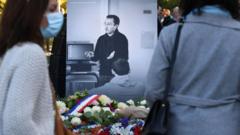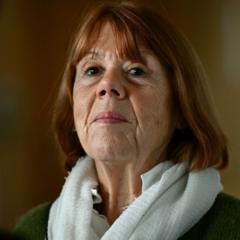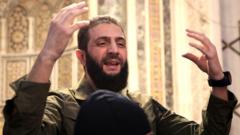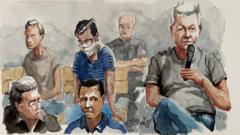After a six-week trial, a Paris court is set to deliver a verdict for eight defendants accused of facilitating the brutal murder of French teacher Samuel Paty in 2020, exploring the legal nuances of whether their actions constitute "terrorist association" despite lacking direct involvement in the crime.
Verdict Looms for Eight Defendants in Samuel Paty Murder Case

Verdict Looms for Eight Defendants in Samuel Paty Murder Case
The Paris trial for eight individuals accused of aiding the murder of teacher Samuel Paty culminates, addressing the complexities of free speech and accountability in the wake of tragedy.
The Paris court is poised to announce its judgment for eight individuals implicated in the 2020 murder of Samuel Paty, a French high-school teacher who became a casualty of international tensions over freedom of expression and religious sensitivities. The trial, lasting six weeks, has spotlighted intricate legal questions regarding the responsibility of those whose actions may inadvertently incite violence.
Among the accused is the father of a schoolgirl whose unfounded allegations against Paty fueled the outrage leading to the horrific act. The trial also features a Muslim activist who orchestrated an online campaign against the teacher and acquaintances of the murderer, Abdoullakh Anzorov, who is said to have assisted him in procuring weapons. Anzorov, a radicalized teenager, murdered Paty in a Paris suburb after claims circulated that Paty disrespected Islam during a lesson about freedom of speech.
Paty’s actual lesson involved presenting controversial images and aimed to educate students on the importance of free expression, with precautions for those sensitive to offensive material. The case has become emblematic of the struggles France faces concerning secularism, freedom of speech, and the limitations of public dialogue.
During the trial, the prosecution argued that the defendants' actions indirectly contributed to the murder, requesting sentences ranging from 18 months to 16 years based on their level of involvement and awareness. They emphasized that despite not directly conspiring to kill Paty, the spread of false information could lead to grave consequences, hence classifying their actions as “terrorist association.”
An emotional moment unfolded as the now 17-year-old schoolgirl, Z. Chnina, publicly expressed remorse for her role, stating that her lies prompted her father to initiate a campaign against Paty, exacerbating the tensions that led to his murder.
Critics, including members of Paty's family, expressed frustration with the prosecution for not seeking harsher penalties, as many questions were raised about the legal ramifications of speech and responsibility in the digital age. The broader context of jihadist violence in France, particularly following the 2015 attacks on Charlie Hebdo, underlines the societal fractures present during the events leading up to Paty's murder.
In defense, lawyers argued that the defendants would not have faced charges had it not been for the murder, emphasizing the retrospective application of legality regarding their respective statements. The court must grapple with the key issue of whether the actions of these individuals can be justified as free speech or construed as culpable in the tragic outcome that followed.




















